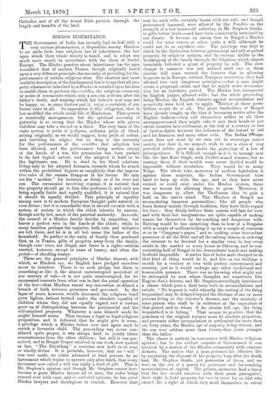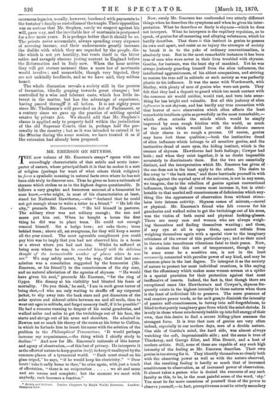HLNDOO INHERITANCE.
THE Government of India has recently had to deal with a very curious phenomenon, a disposition among Hindoos to set aside their own religious law of inheritance, the law upon which their whole society is based, and to adopt one much more nearly in accordance with the ideas of feudal Europe. The Hindoo practice about inheritance has for ages resembled that of modern France, though originally based upon a very different principle, the necessity of providing for the performance of certain religious rites. The shortest and most truthful description of the fundamental law is to say that all pro- perty whatsoever inherited by a Hindoo is entailed upon his sons to enable them to perform the sraddha, the religious ceremony or series of ceremonies which only a son can perform after his father's death, and wanting which his father's soul may not be happy, or, as some doctors put it, enjoy a certainty of any future state at all. So imperative is this obligation, that it has modified the whole social life of Hindooism. That system is essentially monogamous, but the spiritual necessity of paternity is so strong that the Hindoo whose wife proves childless may take a second or a third. The very basis of the caste system is pride of pedigree, ordinary pride of blood, arising originally, as we would suggest, from pride of colour, and surviving its origin ; but so deep is the necessity for the performance of the sraddha that adoption has been allowed, and the performance being useless except at the hands of a son, the permission has been pushed to its last logical extent, and the adopted is held to be the legitimate son. He is dead to his blood relations, living only to his adopted kinsmen, towards whom he stands within the prohibited degrees so completely that the impera- tive rules of the zenana disappear in his favour. He may see his " mother," for instance, as freely as if he were her son. The ceremonial involving expense, it is natural that the property should go to him who performs it, and each son being equally liable and equally qualified, it is natural that it should be equally divided. This principle of equality among eons is to modern European thought quite natural, or even divine ; but it is remarkable that it should co-exist with a system of society in which the eldest inherits by custom, though not by law, much of the paternal authority. As a rule, the council of a Hindoo family decides by majorities, but leaves a perfect veto in the hands of the eldest ; while in many families, perhaps the majority, both veto and initiative are left there, and he is in all but name the father of the household. So perfect is the unity of family thus produced that, as in France, gifts of property away from the family, though inter vivos, are illegal, and there is a right—seldom exerted, however, except in cases of lunacy, and often dis- puted—of checking wastry.
These are the general principles of Hindoo descent, with which, as Hindoos say, we English have pledged ourselves never to interfere. There is no such pledge, but there is something so like it, the almost uninterrupted precedent of our century of rule—it is not quite uninterrupted, for we exonerated converts from what was in fact the penal operation of the law—that Hindoos resent any innovation as almost a breach of faith between governors and governed. In the lapse of years, however, wealth increased, the religious bond grew lighter, fathers fretted under the absolute equality of children whom they did not equally regard, and a custom grew up of distinguishing between the patrimonial and the self-acquired property. Whatever a man himself made he might himself waste. That became a legal or legal-religious proposition, and it followed that he might give it away, a privilege which a Hindoo father now and again used to enrich a favourite child. The proceeding was never con- sidered quite proper, it was always held to justify bitter remonstrances from the other children ; but still it was per- mitted, and in Bengal Proper received in one work, now quoted as law, " The Dayabhag," a sanction now held to be semi or wholly divine. It is probable, however, that no " will " was ever made, no claim advanced to bind persons by an instrument which begins to operate only after death, that every document now called a will was really a deed of gift. That is Mr. Stephen's opinion, and though Mr. Stephen cannot have become a great Hindoo lawyer all at once, the codes being crusted over with cases and ex cathedrd opinions, he has great Hindoo lawyers and theologians to consult. However that
may be, such wills certainly began with our rule, and though pronounced immoral, were allowed by the Pundits on the strength of a few texts—all referring, as Mr. Stephen thinks, to gifts before death—and have been consistently sustained by our Courts. It became an axiom that in Bengal a Hindoo could, for some reason or other, make a will, although he could not do so anywhere else. The privilege was kept in check by the distinction between patrimonial and self-acquired property, by religious opinion, and by extreme dislike to the breaking-up of the family through the litigation which almost invariably followed a grant of property by will. The slow change in manners was not noticed until two or three curious will cases warned the lawyers that in allowing bequests as in Europe, without European restriction, they had allowed two very dangerous principles,—that a man might create a perpetual entail, and that he might order accumula- tion for an indefinite period. The Hindoo law, interpreted by English judges, allowed wills ; but the whole proceeding being Hindoo, the English statutes against accumulation and perpetuity were held not to apply. Neither of these possi- bilities would do at all. The great landholders of Bengal have already caught up the idea of becoming nobles after the English fashion—they call themselves nobles in all their newspapers—and they might take it into their heads to put entire counties into settlement, at the risk of a century or two of faction-fights between the followers of the tenant in tail and his kinsmen, and many other evils. The Indian Overt): ment does not want by its own act to stereotype native society, nor does it, we suspect, wish to see a class of very powerful nobles grow up under the protection of a law of primogeniture. It is difficult enough as it is to manage men like the late Koer Singh. with 70,000 armed tenants, but to manage them if their wealth were never divided would be impossible without revolution. They would be so many Kings. The whole tone, moreover, of modern legislation is against these majorats, the Indian Government tries hard to keep up with the age, and as they have never existed or could exist under the Hindoo system, there was no reason for allowing them to grow. Moreover, it was dangerous to allow the Thellusson idea to gain a hold on the native mind. The Hindoos of Bengal are accumulating immense personalties ; like all people who learn history mainly through tradition, they have little regard for time ; they firmly believe their system will last for ever, and with their hot imaginations are quite capable of making names for themselves by far-reaching and dangerous wills. Nothing would be less surprising than to hear of a Bengalee with a couple of millions locking it up for a couple of centuries or so in "Company's paper," and so making some descendant possessor of all the Debt and all the railway shares, or ordering the interest to be devoted for a similar term to buy every estate in the market or every house in Calcutta, and so con- centrating half of Bengal in his descendants' hands and making freehold impossible. A native line of heirs male charged to do that kind of thing would do it, and live on ten shillings a month for a century or two with perfect contentment and serenity, just as it would undergo any other traditional and honourable penance. There was no knowing what might not be attempted by men whose thoughts are sometimes like Eugene Sue's dreams, and Mr. Stephen accordingly introduced a clause which puts a final term both to accumulations and entails. " No bequest is valid whereby the vesting of the thing bequeathed may be delayed beyond the lifetime of one or more persons living at the testator's decease, and the minority of some person who shall be in existence at the expiration of that period, and to whom if he attains full age, the thing
bequeathed is to belong." That means, in practice, that the grandson of the original testator must be absolute proprietor, and prevents either accumulation or settlement for more than say forty years, the Hindoo age of majority being sixteen, and the son very seldom more than twenty-four years younger than the father.
The clause is entirely in consonance with Hindoo religious opinion ; but to the evident surprise of Government it was received by a section of the Hindoo community with extreme distaste. The notion that a man protracts his effective life by regulating the disposal of his property long after his death had, Mr. Stephen thinks, got possession of them, and we were on the eve of a mania for grotesque and far-reaching accumulations of capital. The priests, moreover, had a fancy
that the law would interfere with their great prerogative, their right to hold property for ever in trust for an idol who cannot die, a right of which they avail themselves to extort
enormous legacies, usually, however, burdened with payments to the testator's family as custodians of the temple. Their opposition was so serious that Mr. Stephen, sorely we suspect against his will, gave way, and the inevitable law of mortmain is postponed for a few more years. It is perhaps better that it should be so. The priests never accumulate, always spending every sixpence of accruing income, and their endowments greatly increase the dislike with which they are regarded by the people, dis- like which is not yet hostility, but vents itself in the bitter satire and savagely obscene jesting current in England before the Reformation and in Italy now. When the hour arrives they will get sterner measure than a mere law of mortmain would involve ; and meanwhile, though very bigoted, they are not unkindly landlords, and as we have said, they seldom hoard.
The whole discussion reveals a society still in the process of formation, blindly groping towards great changes ; but controlled by a wise and tolerant caste, which has little in- terest in the matter, but has the advantage of experience, having passed throne it all before. It is not eighty years since Mr. Thellusson's will provoked an Act of Parliament, or a century since we gave up the practice of settling special estates by private Act. We should add that Mr. Stephen's clause is applied only to property held within the jurisdiction of the old Supreme Courts, that is, perhaps half the per- sonalty in the country ; but as it was intended to extend it to the itterior during the same session, we have treated it as if the extension had already been proposed.



































 Previous page
Previous page